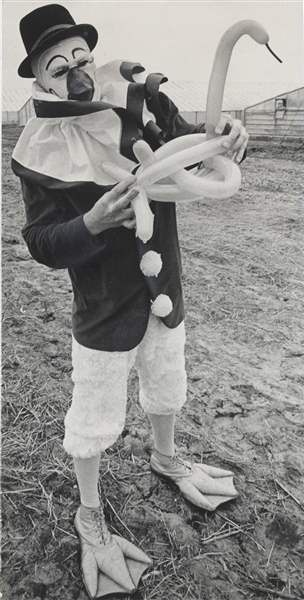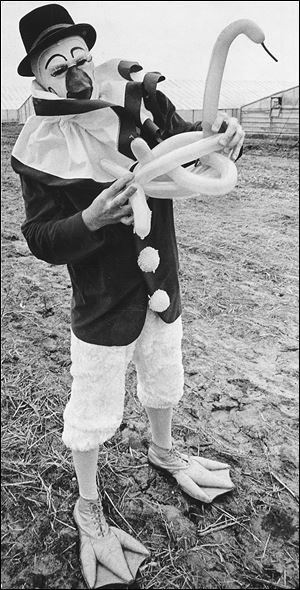
Eugene Curtis, 1934-2013
Professional clown left job to entertain
6/17/2013
Eugene Curtis, as Quacky the Duck Clown, fashions a balloon sculpture in 1969 during a 50-year career.
Don Flory/THE BLADE
Buy This Image

Curtis
Eugene Curtis, a South Toledo resident who quit his factory job to pursue his passion to entertain as a magician known as “Quacky the Duck Clown,” died Friday at the University of Toledo Medical Center.

Eugene Curtis, as Quacky the Duck Clown, fashions a balloon sculpture in 1969 during a 50-year career.
Mr. Curtis, 79, died from heart failure, said his wife, LaVerne.
Mr. Curtis, a 1952 graduate of Maumee High School, attended Bowling Green State University where he majored in physical education. He quit after a year to elope with the former LaVerne Bail. The two were married over the Labor Day weekend in 1954.
“We were just a couple of teenagers who were in love with each other,” his wife said. “He always said he liked my smile.”
Mr. Curtis, who was born on Oct. 8, 1934, to Earl Wilbur and Katherine Curtis of Maumee, held jobs at a florist and in a grocery store in Maumee before going to work at Haughton Elevator Co., where he stayed for 14 years.
He quit in 1968 to become a professional clown, a move that ended the regular paychecks but began a 50-year-career of entertaining.
The early days were rough, his wife said, because she did not work outside the home at that time. She took various temporary jobs to help pay the bills. Later she became his stage assistant and frequently would dress as a clown to work with him.
“There were a lot of lean times,” his wife said, “but it was something he wanted to do.”
At 6 feet, 9 inches, Mr. Curtis was hard to miss on the midways.
Billed as the world’s tallest clown, he often dressed as a duck, although at times he performed his magic shows while dressed in a tuxedo, his wife said. In 1977 he had a part in a two-hour Roy Clark television special State Fair U.S.A filmed at the Illinois State Fair in Peoria.
The duck voice was developed while in high school, where he used it to rattle the teachers, his wife said.
He also used his Quacky voice while working with young people as a recreation supervisor in Maumee.
While on the midway, he would dress like a duck, speak like a duck, and perform magic tricks and perform balloon sculpture, primarily of animals.
His son, Chris, said his father would go through 2,000 balloons a day.
The balloons had to be blown up, which is where his four children were involved by using a portable air compressor.
“It was our responsibility to inflate those balloons. It took a lot of time,” said his son, who had to follow his father on the midway to keep him supplied.
The duck and magic act took the family across the country and into Canada for fairs and festivals during the summer. In the winter, with the family at home, Mr. Curtis would travel solo or perform at area events and conventions.
“My childhood was different than most children my age because when kids were out playing baseball and summer sports, I was out traveling the country and seeing areas most people don’t see in a life time,” his son said.
“It was very rewarding,” he added. “I wouldn’t trade it for a ‘normal’ life.”
Mr. Curtis’ bookings would include 90 days at county and state fairs.
He was a member of the Showman’s League of America-St. Louis Chapter, the World Clown Association, and the International Brotherhood of Magicians.
He operated outside his home on South Byrne Road, where a large sign advertised “Clown for Hire.” His property included a half-acre garden and beehives, which the children helped tend while their father was away.
He belonged to the Maumee Valley Beekeepers Associations.
“Everybody thinks that if your dad is a clown, you must be laughing all the time,” his son said. “It wasn’t like that. He had high expectations of us children.”
In a 1969 profile in The Blade, Mr. Curtis admitted clowning and magic did not provide financial wealth. But the job had another appeal.
“There’s not as much money in it as people think, but there’s more to life than money,” he said.
He said he quit the factory job, a move he didn’t take lightly because of his wife and four children, because of the lack of satisfaction.
“I like clowning. You always see the good points of people. You know, never the bad. That’s the nice thing about being a clown.”
Mr. Curtis stopped traveling for shows about 2009 and stopped performing a year later because of heart issues, his wife said.
He is survived by his wife, LaVerne; daughters Rebecca Curtis, Dorothy Partin Cooch, and Sharon Curtis; son Chris; eight grandchildren; 13 great-grandchildren; brothers Thomas and John, and sisters Kathleen Brandes and Carol Ann Neiman.
His body was donated to UTMC, the former Medical College of Ohio. Memorials are suggested to the UTMC Mundt Fund for research into the treatment of heart failure. A memorial service will be scheduled later.
Contact Jim Sielicki at: jsielicki@theblade.com or 419-724-6050.